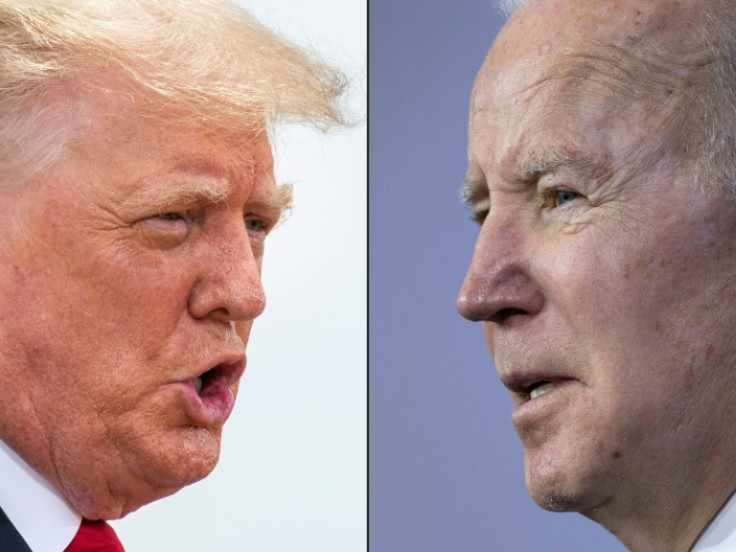
As the U.S. presidential election year is set to begin, polls and political barometer are get an increasing amount of attention. And when it comes to the Latino community, the most recent studies have shown a trend that has President Joe Biden bleeding support in detriment of the former head of State, Donald Trump.
In fact, in the latest poll focused on this demographic and published last week, Trump is seemingly accelerating his gains. The CNBC All-America Survey has Trump with a 5-point lead over current Biden, the first time the former President is ahead in such a poll over his likely competitor in next year's elections. The same poll from two months before had Biden with a 7-point lead.
The survey added that Biden's performance with Latino voters is not just lagging relative to Trump — "it is trending downward overall." "In December 28% of Latino adults approved of Biden as president, down from 35% in October," says the study.
Another poll from Cygnal published in mid November had Biden with a single-digit lead over Trump in four key states with a large representation from this demographic: Florida, Texas, Nevada and Arizona. And separate polls surveying the entire population had Trump on the lead.
The former President has been steadily gaining support with the Latino electorate during the past decade, increasing from 28% in 2016 to 36% in 2020, according to the Pew Research Center. In 2022, Republicans got 39 percent of the Latino vote, the highest percentage since 2004.
CNBC argues that while Latinos have traditionally aligned with Democrats' more progressive policies, the economy is set to play a critical role in next year's elections. And there, Trump has a clear lead.
A recent survey by UnidosUS showed that inflation, the labor market and the economy are currently the biggest concerns for this demographic.
Over half of the respondents stated that elected officials need to address the rising cost of living. They also mentioned being worried about being laid off and about unsafe working conditions.
Another challenge for Biden is the fact that many younger voters, a demographic in which the president still seems to have a lead, are less sure about turning out to vote next year. A December poll by Harvard Kennedy School's Institute of Politics revealed that young Latino voters had the steepest decline among all groups who said they would definitely vote in 2024.
Concretely, the amount who said they would "definitely" vote next year dropped 16 percentage points, from 56 to 40 percent, compared to the poll conducted in the fall of 2019. That is almost 30 percent less than four years ago, making Latino voters the second group with the least amount of respondents behind Black voters.

Overall, the amount of U.S. citizens who "definitely" plan on voting for president dropped from 57 to 49 percent. This is potential bad news for Joe Biden, considering he has a solid, 11-point lead over former President Donald Trump in a hypothetical 2024 matchup. Concretely, it's 41 percent to 30 percent, while 13 percent said they were undecided and 15 percent said they are not going to vote, according to the poll.
That lead increases to 15 percentage points among young people who report being registered to vote and to 24 points among those who said they will definitely vote: 57 percent to 33 percent. In 2020, exit polls reported President Biden winning the youth vote 40 percent to 36 percent, so a lower turnout in this age group could impact his chances of winning across the country.
The silver lining for the president lies among party orientation: most of those who identified as Democrats said they still plan on voting, with a drop of only two percentage points, from 68 to 66 percent. The drop among Republicans, in contrast, was much steeper: from 66 to 56 percent. Figures for Independents went from 41 percent to 31 percent.
The two virtual candidates are focusing a good deal of attention in gaining the Latino vote with ads and interviews, as well as focused messaging. According to an Axios report from November, Trump's team seeks to portray him as a victim of perceived socialist overreach, linking his legal challenges and clashes with Democrats to the struggles faced by many Latin Americans under authoritarian rulers who claim to be socialists.
In a recent rally to counter-program the latest Republican debate in Florida, Trump strategically chose Hialeah, a location with over 95% Hispanic residents, primarily Cuban Americans who constitute a conservative electorate aligned with the Republican party. During the rally, Trump drew parallels between his legal challenges and resistance to communism, and the experiences of Cuban Americans under Fidel Castro's regime.
Biden has adopted a similar strategy, equating Trump with authoritarian Venezuelan leaders Hugo Chávez and Nicolás Maduro.
"We start before the Sun, stop after it's gone down. We build the country. But to some we are invisible. Not to Joe Biden. He sees us, he invests in us, our community, businesses. Republicans don´t, and like dictators want to take things away: health insurance, rights, freedoms and safety," says the 30-second ad, which shows pictures of Trump, Maduro and Chavez in succession. "The difference is clear. Build with Biden," says the ad.
© 2025 Latin Times. All rights reserved. Do not reproduce without permission.





